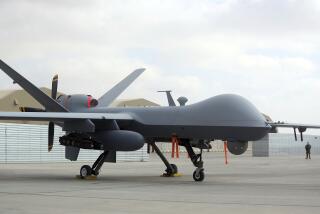Troops on Alert as U.N., NATO Consider Attacking Serbs : Balkans: Air strikes could disrupt uneasy peace in Croatia. Inaction might further erode U.N. authority.
- Share via
ZAGREB, Croatia — The United Nations put its 43,000 soldiers in the Balkans on red alert Sunday as U.N. and NATO officials considered launching air strikes against rebel Serbs in Croatia and Bosnia.
Meanwhile, renegade Muslim forces and Serbian rebels were attacking government soldiers in northwest Bosnia, apparently trying to recapture lost territory before the United Nations could react.
Serbian rebels captured the waterworks for Bihac, a city of 48,000 people, giving them control of the water supply, said U.N. sources, who spoke on condition of anonymity.
While officials of the United Nations and the North Atlantic Treaty Organization declined to rule out any course of action, including a robust attack on Serbian rebel targets, they stressed that the increasingly volatile situation on the ground and the weaknesses of the lightly armed U.N. force are constraining their ability to act.
Striking could trigger a wider war in the Balkans by prompting a Serbian rebel attack on Croatia after almost two years of an uneasy but enduring peace. But doing nothing would further erode the already meager authority of the troubled U.N. mission and could invite retribution from Bosnian Muslim soldiers and civilians fed up with 31 months of international inaction and apparent indifference to their plight.
“We’ve reviewed the options, and all of them are bad,” said a U.N. official after meetings Sunday to discuss a plan of action.
The parleys followed the second consecutive day that Serbian rebel jet fighters from an airfield in a Serb-held part of Croatia launched bombing raids on Bihac. Sarajevo radio reported that an 11-year-old boy died of injuries after one of two Serbian jet fighters crashed into an apartment block filled with refugees. Three unexploded bombs were also discovered near the area, including one found hanging from an apartment balcony.
The assaults reflected the determination of the Serbian rebels and of Muslims loyal to warlord Fikret Abdic to cripple the government army, which defeated Abdic in August and broke through Serbian lines in a stunning advance last month.
A U.N. official in Zagreb earlier reported heavy fighting around Velika Kladusa, Abdic’s former headquarters near Bihac. Government forces there are surrounded, and the official said the Abdic forces appeared to have the upper hand.
As tension mounted, all U.N. troops in Bosnia, Croatia and Macedonia were placed on red alert while NATO warplanes stood by on aircraft carriers in the Adriatic Sea and NATO air bases in Italy.
By authorizing the use of air power against Croatian Serb targets, the U.N. Security Council could unwittingly be leading the Balkans toward a wider war, some U.N. officials fear.
For more than two years now, Croatian forces and the Croatian Serb rebels who occupy 27% of the country have faced off uneasily following a war in 1991 over Croatia’s secession from Yugoslavia.
Negotiators for the Croatian government and the rebel Croatian Serbs recently reached an agreement to re-establish limited economic ties for the first time since the war. But following the Serbian air strikes, the Croatian Parliament rejected the deal.
Milan Martic, president of the Croatian Serbs’ self-proclaimed Republic of Serbian Krajina, threatened Saturday that a NATO attack on the Serbs’ Udbina airfield could prompt the Serbs to retaliate by attacking Zagreb, the Croatian capital. That, in turn, could lead to a counterattack by Croatia, and Bosnia’s war would have overflowed its borders.
Other potential targets for a NATO air strike include Serbian surface-to-air rocket launching positions in Serb-held Bosnian territory east of the Bihac enclave. Over the past two weeks, Serb forces have fired more than 10 of the deadly but unwieldy missiles into the enclave, and several have landed near U.N. bases.
More to Read
Sign up for Essential California
The most important California stories and recommendations in your inbox every morning.
You may occasionally receive promotional content from the Los Angeles Times.













